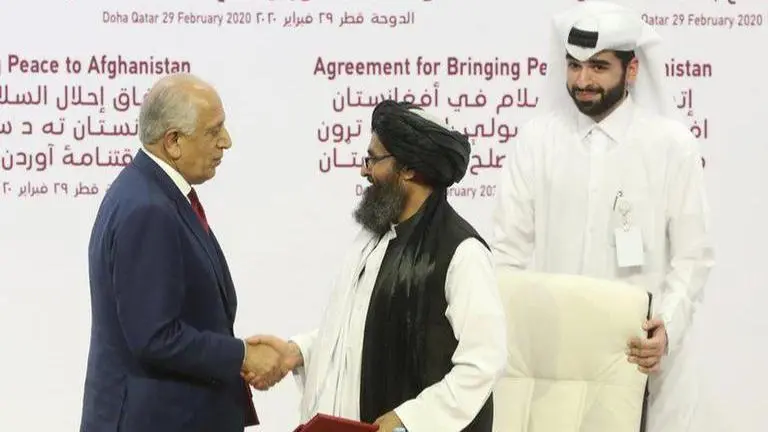Updated 1 March 2020 at 16:12 IST
Afghan peace deal: Qatar expresses dismay as Gulf misses signing; says “absence of wisdom”
Saudi Arabia, welcomed the signing of the peace agreement. In its statement, it made no mention of Qatar’s role, only saying that the agreement helps to restore stability in Afghanistan
- World News
- 5 min read

The tiny nation of Qatar expressed disappointment Sunday that nearly all of its Gulf neighbors snubbed invitations to attend the weekend peace signing ceremony between the U.S. and the Taliban. Qatari Foreign Minister Mohammad bin Abdulrahman Al Thani told The Associated Press in an interview that the presence of Saudi, Bahraini and Emirati officials at Saturday's event in Doha could have been an opportunity to signal unity amid a festering, nearly three-year-old crisis among the Gulf Cooperation Council members that have left Qatar isolated.
“We were hopeful that our GCC brothers and neighbors would join us in yesterday's ceremony,” al Thani said. “We invited them for the ceremony, but unfortunately they didn't show up.”
Instead, he said their absence showed a continuing “absence of wisdom” among Qatar's neighbors at a time when tensions in the Middle East, especially with Iran, are running high. Oman was the only GCC member to send its foreign minister. “We were hoping to see them participating with us because we believe it is a cooperative approach between all the group of friends of Afghanistan," he said, adding later: “We have, unfortunately, an absence of wisdom. In some countries in the region, we want them to be wiser.”
Hosting and facilitating the crucial talks between the Taliban and the US. was a diplomatic coup for regionally isolated Qatar. It helps to strengthen the country's strategic importance, not just as a major gas exporter and host to a sprawling U.S. military base, but also as a U.S. and European ally that can engage with a range of players, like the Taliban.
Advertisement
Saudi Arabia, for its part, welcomed the signing of the peace agreement. In its statement, it made no mention of Qatar’s role, only saying that the agreement helps to restore stability in Afghanistan and benefits the region’s security. American officials had hoped all the Gulf Arab states would participate in the ceremony at which the U.S. and the Taliban signed a peace deal aimed at ending 18 years of war. U.S. Secretary of State Mike Pompeo, who witnessed the signing of the deal, alluded to the Gulf crisis in a separate meeting with Qatari Emir Tamim bin Hamad Al Thani in Doha on Saturday.
The two discussed “the importance of a united GCC in standing against the Iranian regime’s destabilizing activity," according to a US readout of the meeting. Oman was the lone GCC member to send its foreign minister to the ceremony and Pompeo, who visited Muscat just two weeks ago, made a point of greeting Omani Foreign Minister Yusuf bin Alawi Abdullah at the event.
Advertisement
Despite US encouragement to the other members of the GCC, Al Thani said Qatar had received no response to its invitations, which were sent despite a January breakdown in talks aimed at resolving the crisis. The GCC has been split by a rift between Qatar on one side and Saudi Arabia, Bahrain and the United Arab Emirates on the other since 2017. Al Thani said Qatar had still received no explanation for the suspension of the talks in January.
“There is no clear reason for why it's been suspended,” he said. "It was very surprising for us also given the timing with everything that is happening in the region. We believe that this is the time that should unite everyone toward one goal with all this turbulence that's happening with Iraq and Iran and the others. But unfortunately, it didn't happen."
Al Thani lamented that the crisis, which has seen Qatar blockaded by its neighbors and caused economic distress, was lingering at a time of extreme tensions. “We think a united GCC is good for everyone, it's good for the United States, it's good for the stability of the region,” he said. “The GCC was, at a certain point of time, the center of stability in the Middle East region. And, unfortunately, this rift has changed this perception about the GCC and it's become like a source of turbulence in the region.”
Taliban Peace Deal
In a historic move, US peace envoy to Afghanistan Zalmay Khalilzad and senior Taliban leaders Mullah Abdul Ghani Baradar signed the deal in Qatar's Doha on Saturday. Mullah Baradar was released from a Pakistani prison in October 2018, after he was arrested in Karachi in 2010. Two unnamed Pakistani intelligence officials also confirmed that Mullah Baradar was freed "after high-level negotiations," AP reported.
The US military, as per the deal agreement, will leave Afghanistan within the next 14 months, if the Taliban upholds its commitments that the Afghan territory will not be used for terror activities to target the US and its allies. The deal lays the groundwork for negotiations between the democratic government in Kabul and the armed group Taliban. The US has even agreed to lift sanctions against Taliban leaders by August. Washington and Kabul further agreed with the Taliban to exchange prisoners of war by March 10.
(With AP inputs)
Published By : Digital Desk
Published On: 1 March 2020 at 16:12 IST
